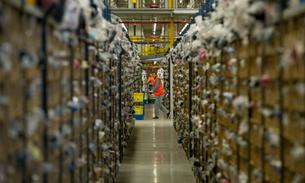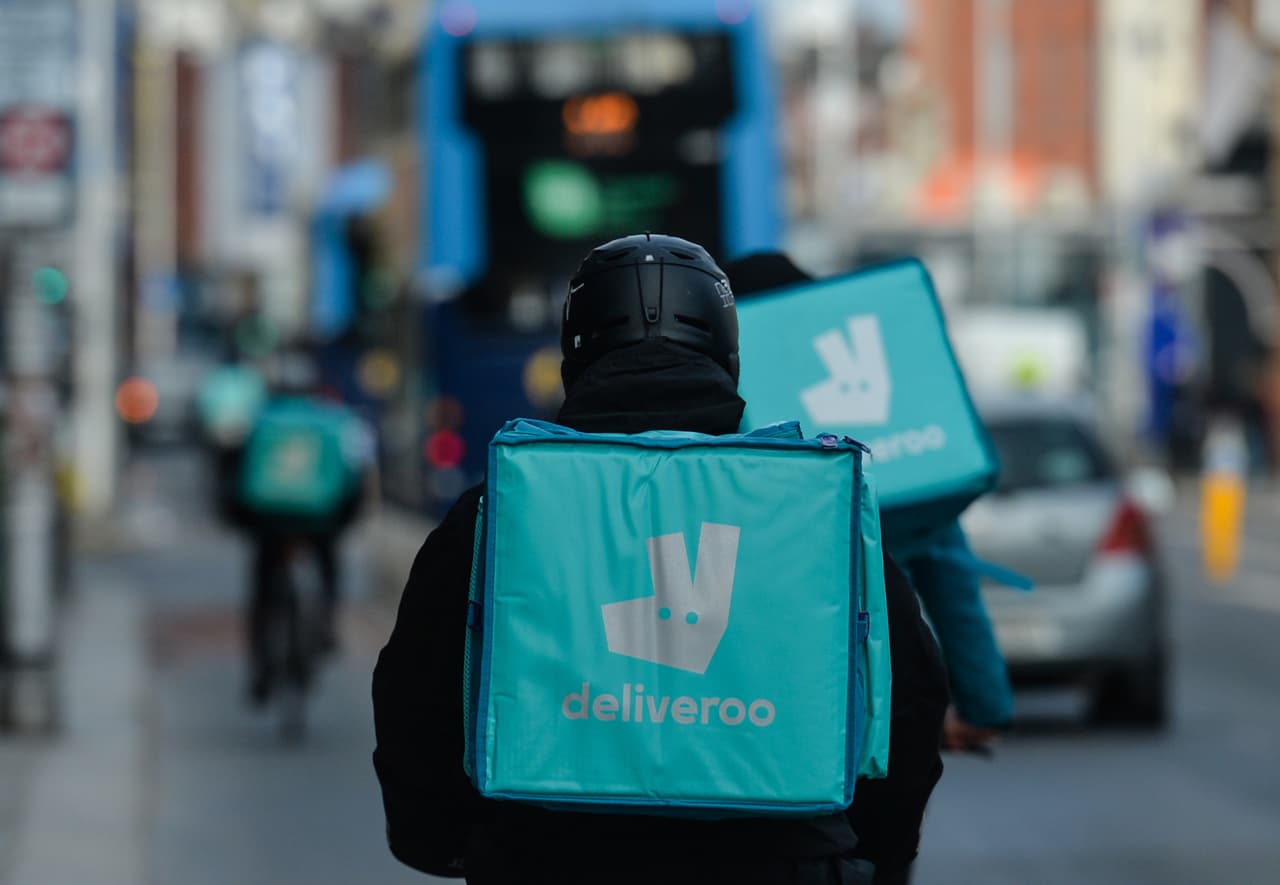
Deliveroo riders can earn as little as £2 an hour during shifts, as boss stands to make £500m
An analysis of hundreds of riders’ invoices shows many riders’ earnings per session falling short of minimum wage levels
As Deliveroo prepares for a multibillion-pound stock market flotation that could net its chief executive as much as £500m, an investigation by the Bureau has found that some of the riders upon whose backs the business was built have been receiving less than the minimum wage per shift.
Our analysis of thousands of invoices from more than 300 riders over the past year shows that one in three made on average less than £8.72, the national minimum wage for those over 25, for their overall time per session in the app. Some earned even less: a cyclist in Yorkshire was logged in for 180 hours and was paid the equivalent of £2 per hour. This is perfectly legal because riders are treated by Deliveroo as being self-employed.
The Bureau calculated pay rates based on Deliveroo’s own generated “invoices”, which document “sessions” where riders logged in, logged out and all the deliveries completed in that time. While exactly how fees are determined is unclear, Deliveroo said it is only “meaningful” to calculate rates of pay for deliveries, not the time between orders, and on this basis the company said its rate was above the minimum wage. In 2019 the company said said riders were being paid, by their calculations, more than £10 an hour on average; half of the couriers in the Bureau’s sample were paid less than that rate across their whole sessions.
Riders are getting these rates even as the company likens them to pandemic key workers. The global lockdowns have seen Deliveroo rise to new heights after years of losses and last year, as Deliveroo announced it had become profitable in almost all its markets, the chief executive Will Shu hailed riders as “heroes” for delivering food to millions across the UK during the crisis.
While Deliveroo riders are classed as “self-employed”, removing any legal obligation to offer worker benefits or the minimum wage, a recent court ruling has put that position in doubt. In February, the Supreme Court confirmed that Uber drivers should be treated as workers, not self employed. As such drivers should be entitled to minimum national wage rates and the entire time drivers are logged on and available for work should be appropriately taken into account when ensuring overall pay.
Deliveroo told the Bureau: “Deliveroo riders have the complete freedom to choose when and where to work and can choose which deliveries to accept and which to reject. 50,000 riders choose to work with Deliveroo, and thousands more people apply to work with us every week. Our way of working is designed around what riders tell us matters to them most - flexibility ... Riders in the UK are paid for each delivery they choose to complete and earn £13 per hour on average at our busiest times. We communicate with thousands of riders every week and satisfaction is currently at an all time high.”
The Independent Workers’ Union of Great Britain (IWGB) developed a tool to collect invoices from Deliveroo riders. The Bureau has independently analysed and checked this data – from more than 300 of Deliveroo’s 50,000 riders across the UK – to produce the first reliable dataset on British gig economy pay. The Bureau also spoke to riders in London, Cardiff, Reading, Newcastle, York and Leicester.
Join the investigation
Help us investigate more stories like this by joining our mailing list for Is Work Working?
Yes! I want to helpResponding to the Bureau’s investigation, Angela Rayner, Labour’s deputy leader, said: “In 2021 a fair day’s work for a fair day’s pay is the very least that working people should be guaranteed.”
Professor Alan Bogg, a labour law expert, said the Bureau’s investigation could prove helpful in securing riders legal protections not currently afforded to them, such as guaranteeing the minimum wage. “If it’s the case that riders are being paid this low a rate that will reinforce the argument that this is precisely the group that is in need of statutory protection,” he said.
The Bureau reviewed the pay documentation from almost 12,000 sessions by 318 riders across the UK, covering 34,000 hours in the 2020-21 financial year. Half (56%) of the riders who took part earned less than an average of £10 an hour for all the time they were logged in. Some took home far less, with one in six (17%) getting less than £6.45 per hour – the lowest possible minimum wage – and one in three (41%) receiving below £8.72, the legal minimum wage for workers over 25.
Deliveroo told the Bureau our sample was “not a meaningful or representative proportion” of their riders. It said: “Riders do not work in hourly patterns, and time logged on does not mean they are working: riders are free to reject work without penalty at any time and can work for other companies while logged in to our app. Almost half of orders are rejected at least once.”
Deliveroo said it looks at average pay “from the moment a rider accepts a Deliveroo order until they complete the order. This is more than the national minimum wage.”
The dataset may understate how many averaged less than £10 an hour for their overall time because invoices do not record any sessions when riders may have logged in but got no work at all.
Alex Marshall, IWGB president, said: “What we have clearly exposed here is just the tip of the iceberg. These are the people who have fallen below the bare minimum requirements we expect for workers. This is before you factor in the cost of doing the job, the lack of rights, the lack of pension and the lack of holiday pay.”
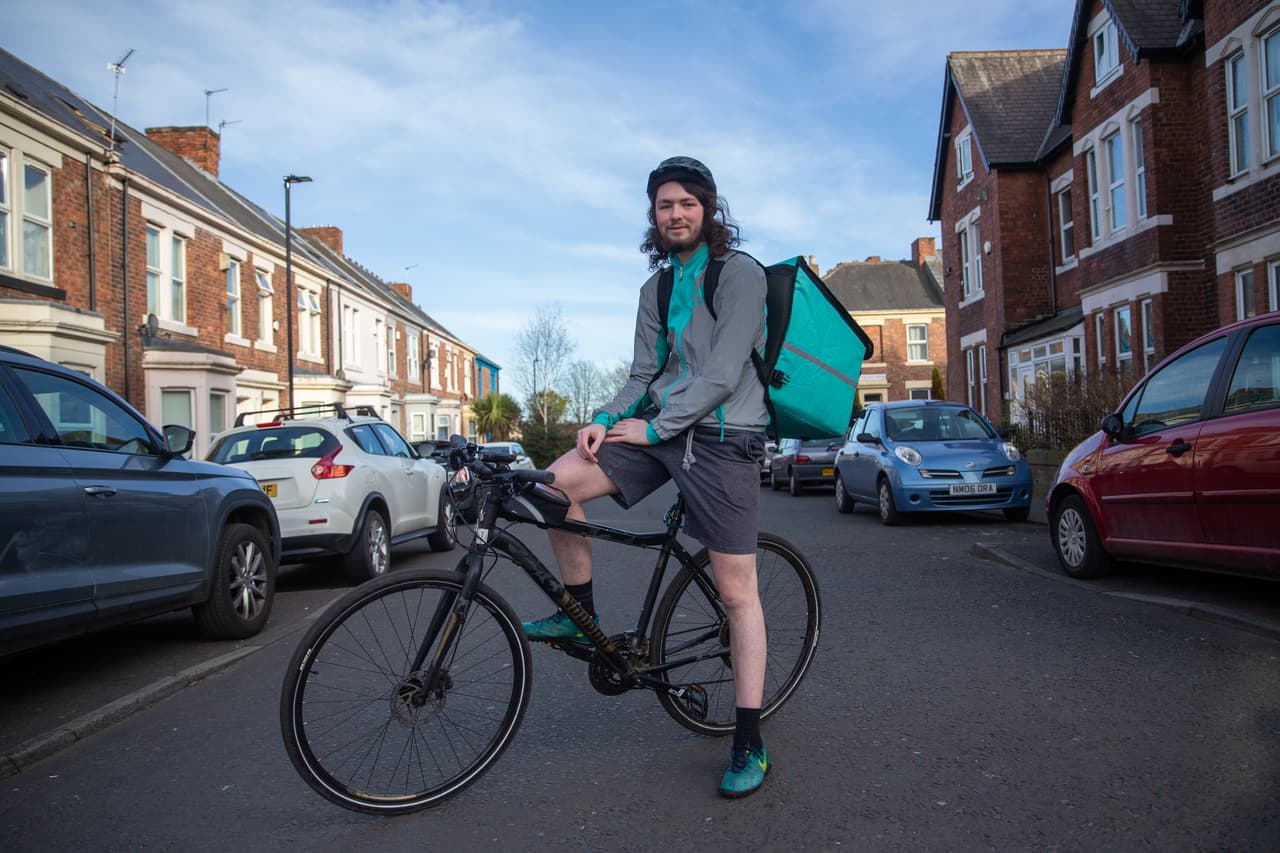
“Demoralising” pay
When Deliveroo couriers in Newcastle went on strike for better pay and conditions in 2019 the company insisted they were earning on average more than £11 per hour or, as a spokesperson put it, “well above the national minimum wage”.
Two years on, invoices covering 650 hours of work in the city suggest many riders there have earned far less on average over their full sessions, at £7.85 per hour. None of those who shared their documentation with the Bureau were paid even close to £11 an hour per session as an average rate.
Reece Lloyd, 21, has been working part time for Deliveroo in Newcastle since 2018. He believes overhiring – Deliveroo said it has doubled its UK couriers from 25,000 to more than 50,000 in the past year – has resulted in riders getting fewer orders and earning less. His own pay over a session now averages at just over £7 per hour, compared to £8-£12 when he started working. “So many new riders for the same amount of jobs means there is less for everybody else, so less money,” he said.
Things got particularly bad at the start of the pandemic, when many restaurants closed and the number of riders far outstripped the demand for deliveries. “You’d go out and sit in the town square and have 30 Deliveroo riders doing nothing with one order every two hours.” On one occasion in late July, he spent almost six hours logged into the app and received only one order – from Burger King, paying £3.80.
Lloyd said he manages to get by thanks to a hardship grant given by his university. He added: “It is demoralising really ... You always have to be checking your bank account, working out how your finances are going to work for the next few months.”
The company said its fee per order and earnings at busiest times have increased year on year, but the Bureau’s analysis also suggested that many riders’ average earnings overall and average deliveries per hour have fallen over the past three years.
Some riders who have earned above the minimum wage rate on average say they still struggle to earn enough to get by after covering their expenses. Ian Morrison, 29, from West Norwood in London, calculates that, despite earning around £12 an hour, a third of his earnings are spent on operating expenses, including petrol, insurance and loan payments on a scooter.
When he started in 2018, Deliveroo paid a fixed rate of £4 per delivery, and by working six to seven days a week, he was able to make a decent living and even pay off some debts. He calls this his “honeymoon phase”. But then Deliveroo introduced “variable rates”, meaning his average pay per delivery dropped to £3.15, he said. He said the company also started asking him to travel longer distances.
One night in November 2019 he was in Waterloo and was sent to do a job seven miles away in Greenwich. After dropping off the meal at a block of flats, he was jumped by eight people who kicked him off his bike. While he was fighting one of them off, another drove off with his moped – his livelihood.
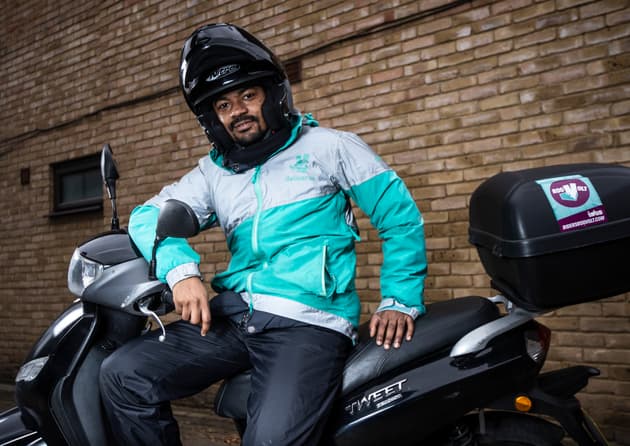 Ian Morrison was set upon and robbed while working for Deliveroo
Courtesy the Daily Mirror
Ian Morrison was set upon and robbed while working for Deliveroo
Courtesy the Daily Mirror
Despite Morrison giving chase, the group got away. When he called Deliveroo, he said he was advised to change his delivery zone. At no point did the company offer to compensate him for the stolen moped (it is not suggested that they were legally obliged to). He stopped working for the company, returning to restaurant work. Months later, when police found the moped, he was unable to cover the costs to get it released from the impound lot.
Morrison thought he would never work for Deliveroo again, but during the pandemic he was furloughed and then had to leave his job. He was given a moped by his father and got back on the road.
He said he still has nightmares about the theft, and working for the company again left him drained. “It has affected my well-being. I find myself being more physically exhausted because I am thinking about how I am going to do it day to day. It's not a sort of job that you can do for a very, very long time.”
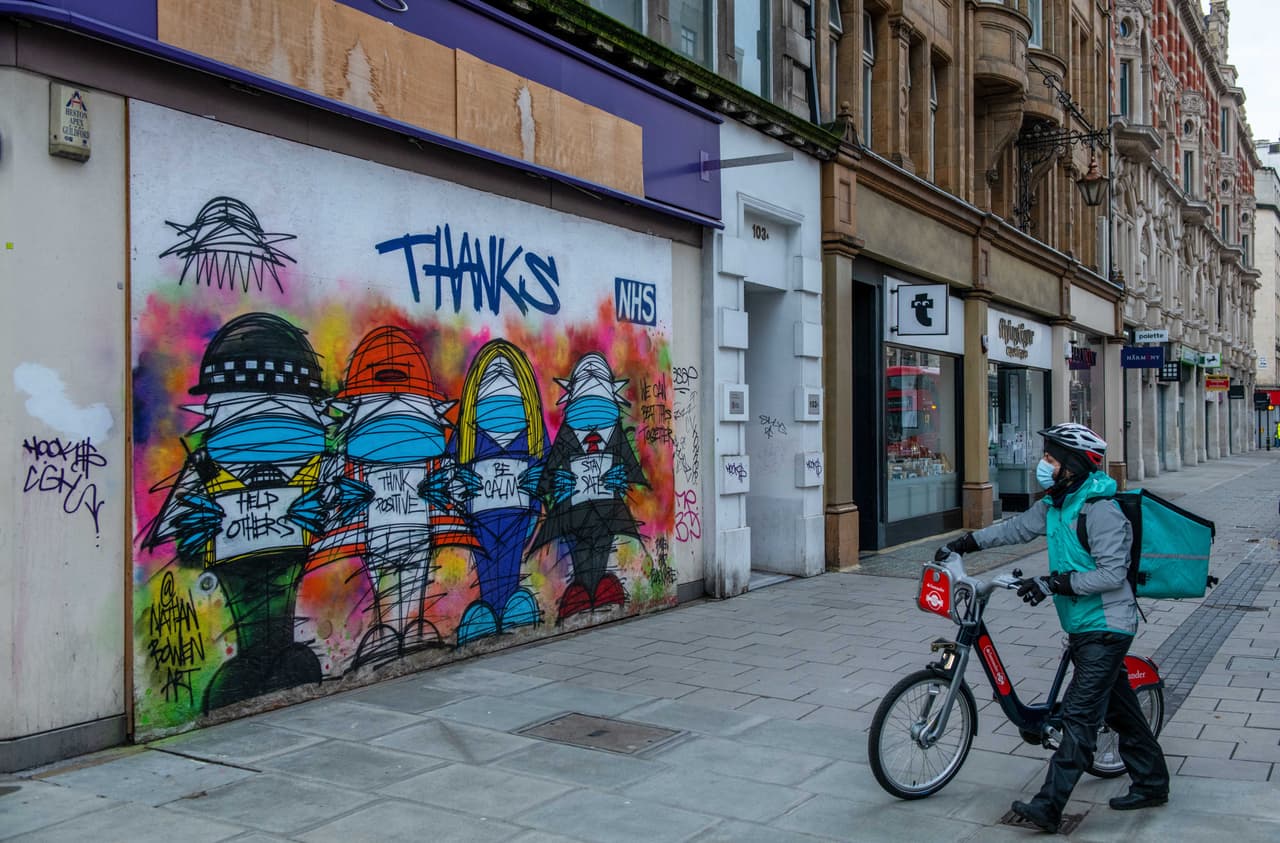
Left in the dark
Deliveroo uses a computer algorithm called Frank to manage which rider is offered which deliveries – although it does not determine fees. Frank, named after a character in It’s Always Sunny in Philadelphia, uses vast amounts of data to predict order timings based on factors including the time of day, the number of couriers logged into Deliveroo’s app and the distance between the customer and the restaurant.
Another system is used to calculate pay. Deliveroo claims its technology ensures workers “maximise earning potential” but riders do not know precisely how deliveries are assigned to them, or how their earnings are calculated, and the pay structure has changed at least three times since 2017.
“It’s not transparent at all,” said Kerry, a Deliveroo rider from London. “Some shifts you really feel like you’ve cracked the algorithm, like it's working perfectly and then you try the same thing and that doesn’t work.”
The fee for any given delivery is set before riders agree to take it on, with the app predicting how long food will take to be prepared and delivered. When restaurants take minutes or even an hour longer than the app predicts, riders are left with the same pay.
Steven Geary, 43, from Reading, gave the example of an order on New Year’s Eve – one of the busiest nights of the year for food delivery riders – in 2019. The food, from his local Nandos, took more than an hour to be prepared. An invoice he shared with the Bureau shows that in the space of three and a half hours that night he was only able to make four deliveries, earning an average of £7.27 per hour over the session.
There is no pay available for the waiting time between logging into the app and receiving the first order – and no pay for shifts where no orders are assigned. “I’ve spoken to hundreds of riders who’ve been logging in, and logging off, without receiving any work for two, three or even four hour periods,” said Alex Marshall from IWGB. In his opinion, “the business model seems to be to oversupply riders for an unknown demand. It costs this company nothing to put more riders on the road.”
Deliveroo told the Bureau the IWGB is a “fringe organisation” which represents very few Deliveroo riders and added the company believes the union is attempting to damage the company's flotation.
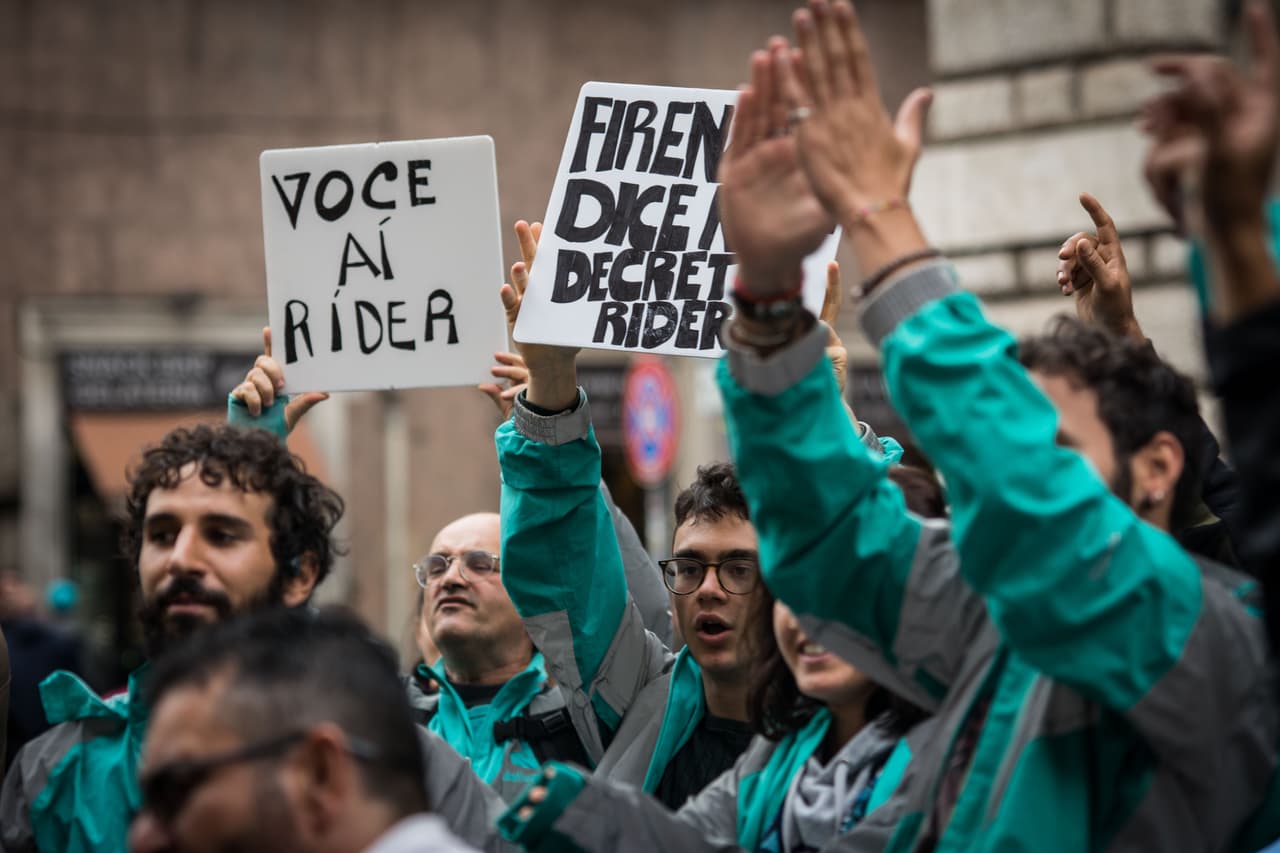
Riders “dependent and subordinate”
Across the globe, Deliveroo has more than 100,000 riders in 12 countries. Many of them are fighting parallel battles for employment rights and recognition as workers.
In Spain, the government is working on a law that would not only grant riders employment rights, but also access to information about the algorithm, while in Italy the government has concluded that riders were effectively employees. Deliveroo plans to appeal but decisions have also gone against the company in Spain, France and the Netherlands.
The recent Supreme Court ruling against Uber may mean the UK soon follows suit. Alan Bogg, a labour lawyer, said that the rights being claimed by London Uber drivers were argued on the basis of drivers being subordinated workers in need of statutory protection.
“I would expect that approach to be applied to the Deliveroo case now,” he said. In his view, “given the evidence the Bureau has identified about the low levels of pay for Deliveroo riders, in circumstances where they have no control over the contractual documentation, I have little doubt now that they would be treated as workers.”
He believes Deliveroo riders are vulnerable to potential exploitation. “They are dependent and they are subordinate ... They are the things that matter now, not the form of the contract.”

Concern among investors
The Deliveroo stock market float is one of the most highly anticipated in London in recent years. While the company has not yet been valued formally, estimates have put it as high as £8.8bn. At that value, Shu’s 6.2% ownership would be worth £500m. Other major shareholders, including Amazon, are also set to pocket huge windfalls.
In its registration documents, Deliveroo said that it would be “adversely affected” if riders were no longer classed as self-employed. The company has at least £112m set aside to cover the impact of ongoing legal proceedings across the globe but the long-term effect of riders being recognised as workers could prove even more costly.
“This could require us to incur significant additional expenses for paying riders or potentially result in us even exiting that market,” the document adds.
The company has headed off concerns about its business practices by setting up a £50m pandemic recovery fund and offering payments of up to £10,000 to its longest serving riders. “This does not come close to compensating riders for a lifetime of precarity and poverty pay,” said Marshall. One rider in York calculated that his £200 Deliveroo bonus amounted to 6.8p for each order he had done.
“These findings raise concerns,” said Tom Powdrill, head of stewardship at PIRC, the investment advisers. “Investors considering taking a position in Deliveroo should familiarise themselves with these matters and the risks and responsibilities involved along with all other relevant factors. Challenges to the current employment model are financially material.”
Earlier this week, Aviva Investors said it would not invest in the company in part due to Deliveroo’s classification of riders as self-employed.

“At some point the government is going to step in”
Deliveroo indicates that most of their riders work other jobs alongside making deliveries and value the flexibility offered by being able to decide when they work.
Djamila, 30, who delivers for the company in York, agrees that flexibility is one of the positives of the job, but added that as her pay has decreased, she has begun logging in for as many as 80 hours a week to get by.
Djamila wants Deliveroo to help prevent what she sees as over-recruiting and introduce a fairer pay system, as well as guaranteeing some basic protections for riders who are injured while working. But ultimately she wants the government, not the company, to guarantee her rights and pay.
“The gig economy is pretty much the employment of the future ... I think at some point the government is going to step in and put some measures in place.”
Reporters: Emiliano Mellino, Charles Boutaud and Gareth Davies
Paid working group: This story was investigated alongside those affected by and close to this subject. Ethan Bradley (Deliveroo rider), Fran Scaife (driver for Stuart logistics company) and Polly Bindman (freelance journalist)
Desk editor: Megan Lucero
Investigations editor: Meirion Jones
Production editor: Frankie Goodway
Fact checker: Alice Milliken
Collaborations and community organising: Eve Livingston, Shirish Kulkarni
Legal team: Stephen Shotnes (Simons Muirhead Burton)
Our reporting on jobs is part of our Bureau Local project, which has many funders. None of our funders have any influence over the Bureau’s editorial decisions or output.
Header image: Deliveroo riders in Dublin. Image credit: Getty Images
Join the Bureau Local
Become part of the Bureau Local — our collaborative network of reporters and citizens — and tell stories that matter
-
Area:
-
Subject:





